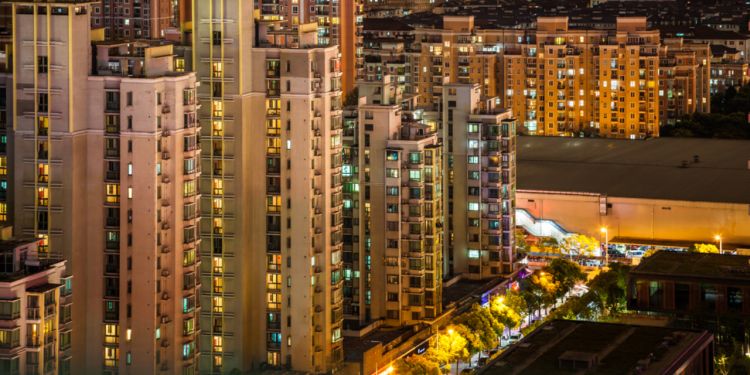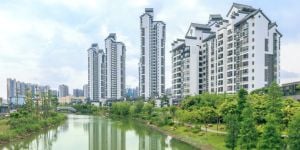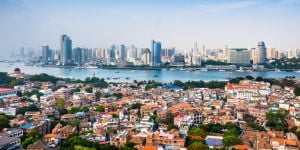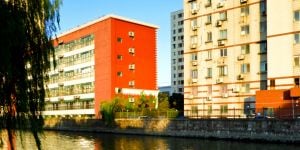
Shanghai is a modern international metropolis that offers plenty of accommodation options for expats, both long-term and short-term. The city has over 25 million inhabitants, including a large number of expatriates from around the world.
Before searching for the perfect apartment, take the time to learn about the different neighborhoods and types of housing available in Shanghai.
Which are the best neighborhoods for expats in Shanghai?
Shanghai covers an area of 6,340 km² — it's a vast metropolis divided into several districts, which are further divided into different towns and sub-districts — plus, the city also has satellite towns and rural areas.
Over 50% of Shanghai's population is concentrated in its historic center, known as Puxi, and covers the districts of Huangpu, Yangpu, Hongkou, Putuo, Zhabei, Xuhui, and Jing'an.
It is also the area that attracts the most significant number of expatriates due to its environment, well-developed infrastructure, and an abundance of western-oriented establishments like restaurants and bars. You will have easy access to essential services and local administrations as well as big shopping malls, office buildings and skyscrapers.
Huangpu and the Former French Concession are some of the trendiest areas for expatriates in Shanghai to live in — with rent prices to match.
New Pudong Area, located on the other side of the Huangpu River, is much quieter, with the rent being less expensive as well, even though the area is attracting more and more business and industrial activity. The city's main airport, Pudong Airport, is also located here.
On the east bank of the Huangpu River, you will find Shanghai's busy financial and trade zone, the district of Lujiazui. Here, you will find the offices of many international companies sitting atop tall glass skyscrapers as well as Shanghai's World Trade Center. While Lujiazui is primarily a business district, there are also posh residential neighborhoods in the area.
To the south of Pudong, you will find the district of Kangqiao. Here, you will find a number of villa compounds as well as several international schools. Kangqiao has a slightly rural feel, but a lot of expats like this area for its quietness and convenience. The area has newly built shopping centers and all the other amenities to cover your everyday needs.
Changning district used to be the main expat area in Shanghai, and it's still home to a sizable expat community. This area has a developed infrastructure, easy access to other parts of the city by public transport and several good local schools. Changning is close to the center of Shanghai and boasts lots of parks and other green spaces. You will also find the Shanghai Zoo and the famous Zhongshan park here.
Hongqiao is another Shanghai district popular with expats. It once used to be a busy industrial zone but has since transformed into a proper residential neighborhood. Hongqiao is quite far from the city center, but you will find many international schools within the district itself. This district has a good housing infrastructure with a lot of high-end apartments and villas with private gardens and swimming pools. Hongqiao is also home to a popular entertainment and nightlife spot — the Hongmei Lu pedestrian street.
Jing'an district was named after the famous temple by the same name that is located here. It's one of the most popular expats neighborhoods in Shanghai. The district is a busy commercial area — but there are also lots of accommodation options for all budgets: from low to high end. Life in Jing'an is very convenient as there are lots of shopping malls, restaurants, bars and clubs in the area. Jing'an is also well-connected to other parts of Shanghai by public transport.
Xuhui covers most of Shanghai's French Concession. The demand for housing in this district is very high — and so are the prices. The housing offer in Xuhui mostly consists of classic villas and posh apartments, and many diplomats and government officials choose to settle here.
Huangpu is the heart of Shanghai. It's home to People's Square, Shanghai Grand Theatre, Shanghai Museum and the city's most famous shopping street — Nanjing Road. You will also find the famous Bund, where lots of buildings dating back to the 1930s frame the banks of the Huangpu River. This is one of the main tourist attractions in Shanghai, with a lot of entertainment and commercial locations. There is some residential housing in the area as well, but your options will be limited.
What types of accommodation are available in Shanghai?
Shanghai offers a variety of accommodation options: apartments, individual houses, villas, studios, etc. Most of the available housing is already well-furnished and comes equipped with the standard set of appliances: a washing machine, a TV set, an oven, and an air conditioning system. You can also choose to share an apartment — a widespread practice among expats in the city who want to live in central areas without overspending on rent. If you are staying for a short time, Shanghai offers plenty of hotels and serviced apartments.
Most modern residential buildings in Shanghai have standard western-style apartments. However, if you live in an older building, the apartments may be more Chinese style.
Chinese apartments generally have rather small rooms. Kitchens also tend to be more utilitarian and just big enough to house all the necessary kitchen appliances. Most apartments are equipped with gas, but in some cases, you may need to use an electric cooker. You won't find bathtubs in most apartments in Shanghai — unless you are renting something quite expensive. Most apartments come with balconies. However, balconies can be quite small, and most families in China use them for drying clothes and storage rather than as a place to enjoy the views from.
Some expats in Shanghai prefer to live in closed gated communities. In China, these are often referred to as “gardens”. These types of complexes often have lots of facilities within their walls: gyms, coffee shops, kindergartens, and more.
Your choice of accommodation will most likely depend on your budget and the length of your stay in the city.
Rent prices in Shanghai
The cost of living in Shanghai is considered the highest in China — especially so when it comes to real estate and rent. Shanghai is the 12th most expensive city in the world, according to the Mercer Cost of Living Survey 2022.
A one-bedroom accommodation in Shanghai can cost anything from RMB 6,000 to 15,000, depending on the location and the type of accommodation you are renting. If you want to rent a two-bedroom, you should budget for around RMB 8,000 and sometimes even higher.
The pricing heavily depends on the district you plan to settle in. Some of the most expensive accommodation options in the city are the old villas in the French Concession as well as newly-built modern high-rises in the city center. Living in these areas is very convenient, and, in addition to a variety of western amenities, there is a vibrant expat social scene.
The further you travel from the city center, the more economical your stay will get. Shanghai is a very well-connected city with metro lines covering most of its urban territory, including even its remote industrial districts. Thus, if you don't mind commuting during rush hour, staying on the outskirts of the city can be quite budget-friendly. Additionally, if you are willing to compromise the comforts of a western-style apartment in favor of a more traditional interior, you will be able to save even more on rent.
How to pay utility bills in Shanghai
Utilities in China generally work on a pre-paid basis. To pay utilities, you will need to use a special card that you can top up at a utility meter, bank and other locations across the city. You can check with your landlord about the nearest locations to pay your utilities. Make sure not to lose your utility cards, as these can be quite difficult to replace.
However, if you don't want to bother with the card system, you could ask your landlord to manage the rent payments for you. In this case, you will be adding the amount of your bills to the monthly rent you transfer to your landlord. This may be the best arrangement if you are new to the city and this would be your first time handling utilities in China.
If you live in a gated residential community with a management office or concierge, you may also be able to pay your utilities there. This will make things much easier, especially if you are new to China. These types of residential complexes are popular with foreigners — so you may also have fellow expats in the neighborhood to ask for guidance.
How to find accommodation in Shanghai?
The best way to get acquainted with Shanghai's real estate market is to check apartment hunting websites like Smartshanghai. This will give you a good idea of house prices in the area you like and what type of accommodation is within your budget. You can also check local resources like Anjuke, 58.com and others. It's also a good idea to check with local expat forums such as Shanghai Expats.
Most apartment ads will indicate how big the apartment is, where it is located, rent conditions (deposit amount) and whether the ad has been posted by a real estate agent or the owner. If you are interested in taking a look at the place, message the author of the post with your contact details. In China, the most popular way to communicate online is by using the WeChat app. The app has over 900 million users and is the number one tool you will need for your everyday life in China. WeChat is primarily a messenger app — but you can also use it for shopping online, paying for goods and services via the QR code, and more.
Once you get in touch with a real estate agent or your potential new landlord, they will probably ask you for your WeChat ID. This is why it's a good idea to download the app and learn how to use it before you start your apartment hunt in Shanghai.
Another way to look for apartments in the city is by visiting different districts and neighborhoods. Once you've found the location you like, you should easily find a real estate agency office nearby. The agency will probably specialize in the accommodation offers in the area, so you will have a better chance of renting an apartment in the area you prefer. If you're looking to rent in gated residential communities, you may also ask the “baoan” (security guard) for any available rentals. The baoan can put you in touch with landlords renting out apartments in the complex.
Important:
Renting accommodation directly from the landlord will help you avoid extra costs such as the agent's finders fee. However, if you're new to Shanghai, don't speak Chinese, and are not yet familiar with how things work in the housing market, it will be in your best interest to rent an apartment through a real estate agent. This way, you will have someone experienced representing your interests. Plus, in case of a dispute with your landlord, you will be able to turn to your real estate agent to help resolve it.
Lease agreements in Shanghai
There are several things you will need to pay attention to when signing the lease agreement.
- Most rental agreements are written in Chinese. Some will have a shorter English version attached or a translation line under each line in Chinese. If your rental agreement is written entirely in Chinese, get a translator to provide you with an English copy. Never sign any contract in Chinese if you don't understand the meaning of every clause. Even if your contract comes with an English translation, it may be best to have a translator give it another look just to ensure that the original translation is accurate.
- If you are new to Shanghai and China in general, it's best to have a Chinese friend or colleague present when you sign the lease. This way, you will be able to easily address any issues that may come up during the signing. Your Chinese friend will also have a better understanding of what to look out for when signing the lease.
- When you sign the rental agreement in China, there will be an inventory of all the items in the apartment attached to the contract. This includes furniture items, household appliances, apartment decorations, and more. It's important that you give the apartment a proper walk-through and check if all the items on the list are there. If you notice that anything is missing, let the landlord or the real estate agent know. This is the best way to avoid any future disputes with the landlord when you have to move out.
- Make sure to check the apartment for any damage or wear. If you notice any anomalies, it's a good idea to take a picture of them and show them to the landlord or real estate agent before signing the lease.
- In most cases, you will be asked to pay a two-month deposit upfront when you rent an apartment. If you are renting a place via a real estate agent, you will also need to pay the agent's fee, which normally amounts to half a month's rent. Make sure to keep your deposit receipts till the end of your lease. You will need them to get your deposit back at the end of your stay.
We do our best to provide accurate and up to date information. However, if you have noticed any inaccuracies in this article, please let us know in the comments section below.











